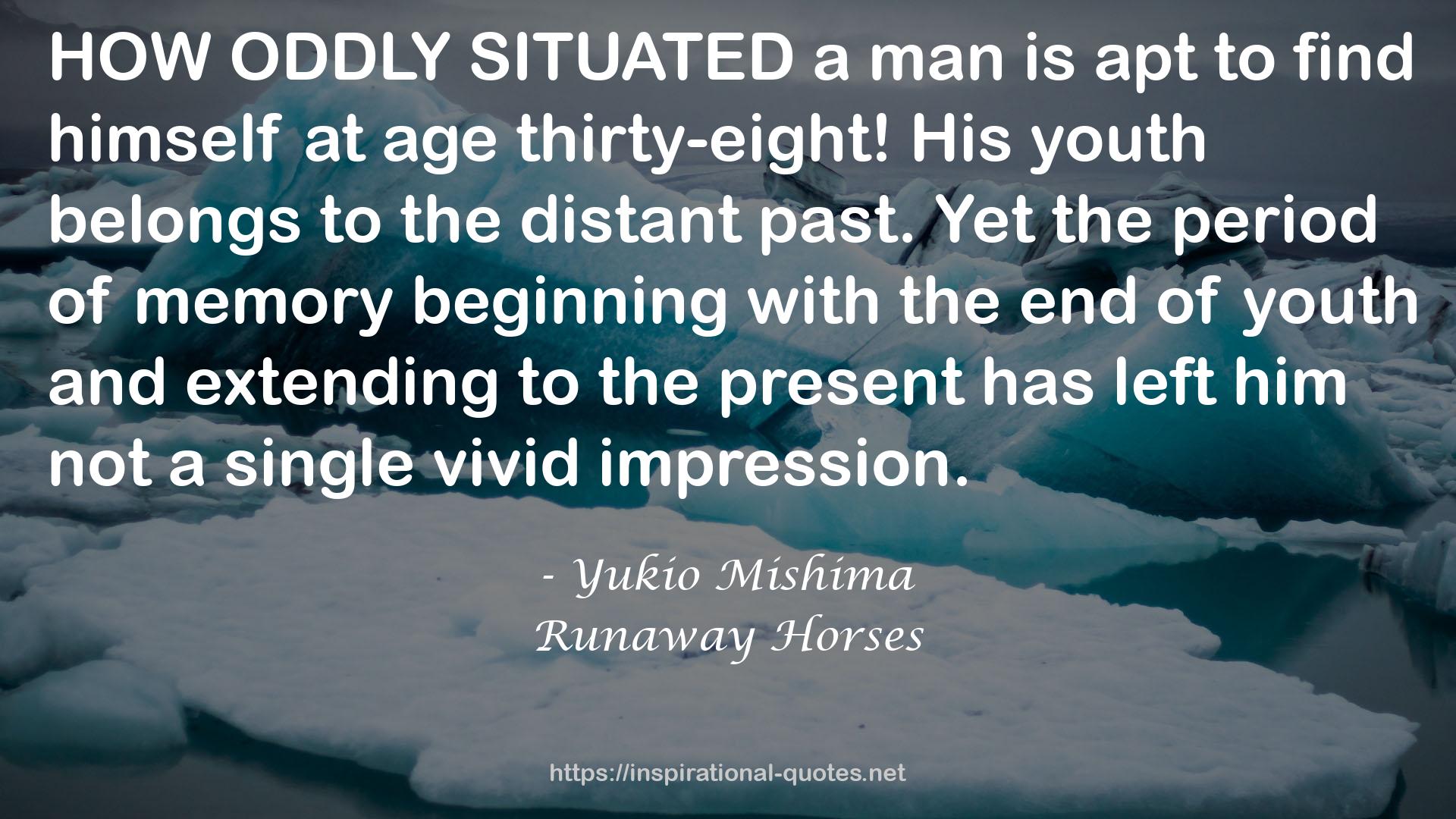23
" The sins I refer to have nothing to do with the law. And the greatest sin is that of a man who, finding himself in a world where the sacred light of His Majesty is obscured, nevertheless determines to go on living without doing anything about it. The only way to purge this grave sin is to make a fiery offering with one’s own hands, even if that itself is a sin, to express one’s loyalty in action, and then to commit seppuku immediately. With death, all is purified. But as long as a man goes on living, he can’t move either right or left, or take any action whatever, without sinning. "
― Yukio Mishima , Runaway Horses
33
" If men brought their hearts together beyond a certain degree, if they were intent upon making their hearts one, did not a reaction set in after that brief fantasy had passed, a reaction that was more than simply alienation? Did it not inevitably provoke a betrayal that led to complete dissolution?
Perhaps there was some unwritten law of human nature that clearly proscribed covenants among men. Had he impudently violated such a proscription? In ordinary human relationships, good and evil, trust and mistrust appear in impure form, mixed together in small portions. But when men gather together to form a group devoted to a purity not of this world, their evil may remain, purged from each member but coalesced to form a single pure crystal. Thus in the midst of a collection of pure white gems, perhaps it was inevitable that one gem black as pitch could also be found.
If one took this concept a bit further, one encountered an extremely pessimistic line of thought: the substance of evil was to be found more in blood brotherhoods by their very nature than in betrayal. Betrayal was something that was derived from this evil, but the evil was rooted in the blood brotherhood itself. The purest evil that human efforts could attain, in other words, was probably achieved by those men who made their wills the same and who made their eyes see the world in the same way, men who went against the pattern of life’s diversity, men whose spirit shattered the natural wall of the individual body, making nothing of this barrier set up to guard against mutual corrosion, men whose spirit accomplished what flesh could never accomplish. Collaboration and cooperation were weak terms bound up with anthropology. But blood brotherhood . . . that was a matter of eagerly joining one’s spirit to the spirit of another. This in itself showed a bright scorn for the futile, laborious human process in which ontogeny was eternally recapitulating phylogeny, in which man forever tried to draw a bit closer to truth only to draw a bit closer to truth only to be frustrated by death, a process that had ever to begin again in the sleep within the amniotic fluid. By betraying this human condition the blood brotherhood tried to gain its purity, and thus it was perhaps but to be expected that it, in turn, should of its very nature incur its own betrayal. Such men had never respected humanity. "
― Yukio Mishima , Runaway Horses
34
" If men brought their hearts together beyond a certain degree, if they were intent upon making their hearts one, did not a reaction set in after that brief fantasy had passed, a reaction that was more than simply alienation? Did it not inevitably provoke a betrayal that led to complete dissolution?
Perhaps there was some unwritten law of human nature that clearly proscribed covenants among men. Had he impudently violated such a proscription? In ordinary human relationships, good and evil, trust and mistrust appear in impure form, mixed together in small portions. But when men gather together to form a group devoted to a purity not of this world, their evil may remain, purged from each member but coalesced to form a single pure crystal. Thus in the midst of a collection of pure white gems, perhaps it was inevitable that one gem black as pitch could also be found.
If one took this concept a bit further, one encountered an extremely pessimistic line of thought: the substance of evil was to be found more in blood brotherhoods by their very nature than in betrayal. Betrayal was something that was derived from this evil, but the evil was rooted in the blood brotherhood itself. The purest evil that human efforts could attain, in other words, was probably achieved by those men who made their wills the same and who made their eyes see the world in the same way, men who went against the pattern of life’s diversity, men whose spirit shattered the natural wall of the individual body, making nothing of this barrier set up to guard against mutual corrosion, men whose spirit accomplished what flesh could never accomplish. Collaboration and cooperation were weak terms bound up with anthropology. But blood brotherhood . . . that was a matter of eagerly joining one’s spirit to the spirit of another. This in itself showed a bright scorn for the futile, laborious human process in which ontogeny was eternally recapitulating phylogeny, in which man forever tried to draw a bit closer to truth only to be frustrated by death, a process that had ever to begin again in the sleep within the amniotic fluid. By betraying this human condition the blood brotherhood tried to gain its purity, and thus it was perhaps but to be expected that it, in turn, should of its very nature incur its own betrayal. Such men had never respected humanity. "
― Yukio Mishima , Runaway Horses

